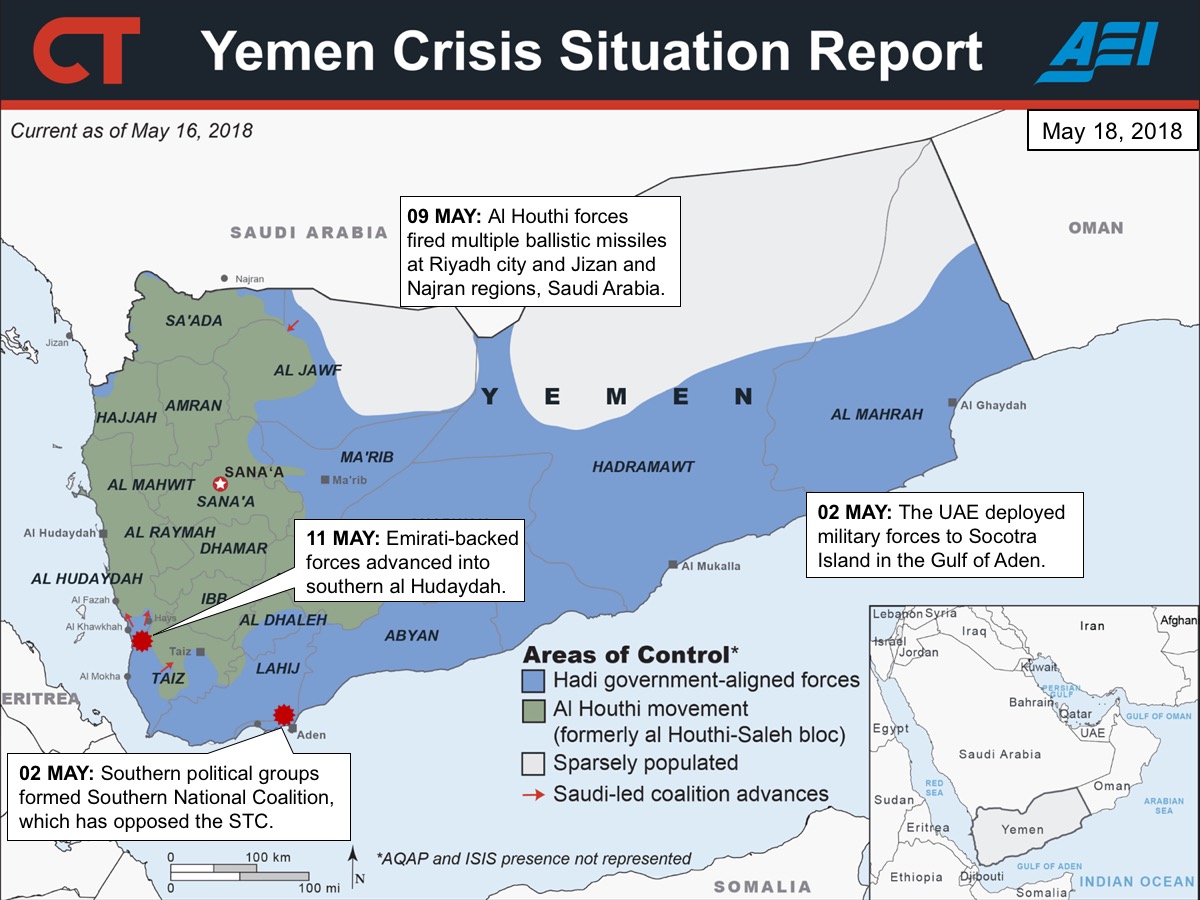The Saudi-led coalition is setting the stage for an offensive to retake al Hudaydah port. A renewed anti-al Houthi offensive could hobble the UN Special Envoy’s efforts to resume peace talks.
Emirati-backed Yemeni forces began an offensive to seize control of southern al Hudaydah governorate, which will position forces to advance on al Hudaydah port. The Yemeni National Resistance Forces, commanded by Brig. Gen. Tariq Saleh, and Southern Giants Brigade forces progressed into al Hudaydah’s al Tuhayta and al Jarahi districts on May 11 from Taiz governorate. An April 19 offensive to secure a secondary road that runs from Hays city in al Hudaydah to Mokha junction in Taiz governorate consolidated the forces’ position after seizing Hays in early February. On May 14, Emirati forces conducted an amphibious assault dubbed “Operation Red Thunder” to destroy an al Houthi command center in Faza area in al Tuhayta district.
Divisions within the anti-al Houthi coalition surfaced over the issue of the UAE’s military presence on Socotra Island. The UAE deployed over 100 soldiers and several armored vehicles to Socotra Island on May 2. Socotra residents protested the Emirati military presence on May 7. Yemeni Prime Minister Ahmed bin Daghir’s cabinet denounced the Emirati military presence as unjustified on May 5 after the UK’s Independent and other media reported on the UAE’s “annexation” of the island. The Emirati-backed Transitional Political Council of the South (STC), which has also called for bin Daghir’s replacement, responded by supporting the UAE’s development role in Socotra. A new coalition of southern political parties, established to contest the STC’s representation of southerner Yemenis, labeled Emiratis as “occupiers” of southern Yemen and called for the expulsion of UAE troops. The Southern National Coalition, formed on May 2, includes members of the Southern Resistance and the Southern Movement (Hirak). The group’s establishment and opposition to the STC and the UAE may indicate a more organized resistance to Emirati counterterrorism operations and actions throughout southern Yemen.
Al Houthi leadership may be preparing for the upcoming offensive against al Hudaydah and possibly other parts of northern Yemen by consolidating power in Sana’a and sustaining aggressive military actions against Saudi Arabia. Newly appointed al Houthi Supreme Political Council President Mahdi al Mashat met with tribal dignitaries and senior officials from across Sana’a governorate in the capital city, Sana’a, to discuss maintaining unity among al Houthi-aligned forces on April 30. U.S.- and UN-sanctioned Al Houthi commander Abdullah Yahya al Hakim AKA Abu Ali al Hakim arrested several associates of late Supreme Political Council President Saleh al Samad, including Department of Moral Guidance leader Yahya Mohammed al Mahdi, the same day. The al Houthi leadership may have ordered the arrest of these individuals to preempt any internal challenges after Samad’s death. A Saudi-led coalition airstrike killed Samad on April 19 in al Hudaydah city. Al Houthi forces launched at least 20 ballistic missiles at economic and military targets in Saudi Arabia between April 25 and May 15, including at least two missiles targeting Riyadh on May 9.
The new offensive in al Hudaydah may hinder UN Special Envoy Martin Griffiths’ attempts to engage al Houthi leadership in a new round of consultations and planned negotiations. Griffiths began a new round of consultations with Yemeni stakeholders on April 30 and met with officials from the Hadi government, the General People’s Congress (GPC), and Emirati officials. Griffiths’ proposal, which he will present to the UN Security Council in June, includes disarming groups, incorporating al Houthi officials into the Yemeni government, and holding national elections. Griffiths asserted that a postponed visit to meet with al Houthi officials in Sana’a city has not restricted his access to the al Houthi movement. He warned that an escalation in al Houthi ballistic missile attacks and Saudi-led coalition operations may affect negotiations.
A Saudi-led coalition offensive towards al Hudaydah port may undermine UN-led efforts to resume negotiations. Control of al Hudaydah is likely an unstated precondition for the Saudi-led coalition to support renewed peace talks. The al Houthis may justify abstaining from talks because of the coalition’s offensive, which is unlikely to deal a significant enough blow to the al Houthis strength to bring them to the table.
Miranda Morton, Teresa Fellner, and Maher Farrukh contributed research to this report.

